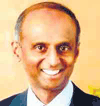| When
business cultures clash
Conflicts
of interest can cover a multitude of sins, but when it becomes a
battle of control for a profitable company by two parties from different
cultures it can get nasty. It is therefore inevitable that the case
will go before the courts. But even then, the delay and appeal mechanism
can frustrate to the point of giving up: but in this case both parties
are only interested in winning.
The plot involves an Australian company, Chalmway Proprietary Ltd,
taking over a failing Canadian firm, Rystar, that ran Ruhuna 2001
Multivision, the operator of a cable TV network, in 1997. Chalmway
held 90 percent and invested $12 million in the venture, where its
10 percent partner, Southern Development Authority (SDA), provided
the licence. Or did it …?
The point here is that it all depends on who you listen to. On one
side we have the above paragraph, yet from the other the role of
Chalmway and Rystar are reversed.
But at the time, in a bid to get local business or individuals involved
to look after the administrative side of the cable company, Nihal
Hettiarachchi’s Osni Lanka, a joint-venture company that exports
coir and also invests in stocks and shares, was brought on board
by Chalmway. An agreement was reached by the shareholders and the
Hettiarachchi Group during this time for the latter to invest $500,000
(Rs 50 million) in Rystar.
The problem here is that Rystar was a failing company due to bad
performances and a lack of bill-paying to cable companies. The Hettiarachchi
Group say they were invited to buy a majority share in Rystar, hence
the $500,000. But as Rystar was delisted from the Canadian stock
exchange, the shares couldn’t be bought; so promissory notes
and securities pledge agreements were issued. Hence the family “technically”
had board control of Rystar, and that if the Canadian company didn’t
comply with promissory notes, the collateral shares would automatically
be owned by the Hettiarachchi Group, according to Mr. Hettiarachchi.
In February 2004, Chalmway was bought by HLT Ltd, an Australian
company, and to the former’s surprise found out that it didn’t
hold what it assumed to be a majority share, due to the Hettiarachchi
Group claiming ownership to 51 percent, according to James Scobie,
the current Managing Director of Multivision. So with no other option
to get what it paid for, Chalmway felt the need to go to court to
decide the matter – and so the legal tussle began, and is
still going on.
From records seen, Chalmway has the company as far as the Commercial
High Court is concerned, but this position is hotly contested by
the Hettiarachchi Group, as they believe they have a majority share
in Rystar, they own the company. So presently things are pending
a Supreme Court decision.
What comes to light now is the accusations of intimidation from
both sides, with the police playing spectator, despite complaints
being put forward in numbers. On the Chalmway side there are alleged
death threats, while on the Hettiarachchi side there is alleged
thug mentality and threatening behaviour with firearms – with
each party claiming the other is not arguing the law but taking
it into their own hands.
Claims and counter claims of “dishonest” behaviour are
being flung around, and influence peddling at high levels of successive
administrations. According to Mr Scobie the company has sought the
intervention of the Australian High Commission in Colombo, where
matters have even gone all the way to Canberra, where the Australian
government sits.
The reason for this is the intimidation that Mr. Scobie says he
and his associates have had to deal with, not to mention the worries
the Multivision staff has had to go though over the months, including
the brief closure of the premises for safety purposes.
But Mr. Hettiarachchi denies this, saying that there are motives
behind the dispute that concern people who first invited him on
to the board, but now want Multivision back as he and his associates
have turned the company around to a profit making venture.
Matters took on a new twist on March 10th and then again on the
15th, as they were caught on close-circuit TV cameras. The CCTV
film, supplied by Mr. Scobie and seen by this newspaper, shows two
events that take place outside Multivision’s premises. The
nature of the people captured on film seem rather obvious, where
large numbers of men turn up outside Multivision, now run by the
Australians. Again Mr. Hettiarachchi says the first visit on the10th
was to get his staff back in, in accordance with the lifting of
a restraining order.
The second footage, on March 15 at around 7.30pm, shows a rather
nastier picture, as they show a number of men carrying guns. Mr.
Hettiarachchi says he doesn’t know who those people were and
asks the pertinent question: as there were policemen around “why
wasn’t anyone arrested?”
Mr. Scobie says: “Certain orders come from higher up”,
but does not elaborate.
Chalmway has won the important cases, and after the Commercial High
Court on April 21, 2005 confirmed that Chalmway did own 90 percent,
with the rest held by the SDA. Even though the court didn’t
remove members of the Hettiarachchi family from the board, a shareholder
meeting in Australia removed the Hettiarachchi group (directors)
and chose new ones.
Chalmway is in the driving seat at the moment and running the business
– but at a cost, according to Mr. Scobie. Other than the continuing
legal fees, the company keeps up to 40 security guards on the premises.
And then you have Mr Hettiarachchi and his associates, who would
like to see the fruition of their $500,000 investment.
 Top
Top |
|
|
|

ISB
develops course for Hayleys
Indian
School of Business (ISB) – India’s premier global business
school – recently developed and organised an Executive Education
Programme for the senior management of Hemas Holdings in Sri Lanka,
and now is developing one for Hayleys.
The special programme designed to guide the senior management of
Hemas, offered a platform for growth alternatives, a strategy framework
for mergers, acquisitions, a clear strategy and a direction to the
group.
According to Husein Esufally, CEO of Hemas Holdings, “ISB
offers exposure to strategic thinking where much of management work
is done in the form of contextual case studies.
Apart from being benefited through a faculty consisting of experts
in executive training, Indian industrialists were brought in to
share practical experiences. The programme was tailor made to fit
the organisation’s needs.”
Deepak Chandra, Assistant Dean Executive Education of ISB, said
the Centre for Executive Education provides value propositioning
from bringing together a world-class faculty to working with organisations
in order to understand their needs and create relevant programmes.
He added that ISB will be looking at long term relationships with
Sri Lanka in terms of attracting more students, corporate sponsors,
research projects, among others.
“After the successful completion of the Hemas programme, ISB
will now work with Hayleys Limited for developing future corporate
strategies for the company”. (NH)
 Top
Top |
|
|
|

Standard
Chartered last week said Clive Haswell will take over as CEO Sri
Lanka from Vishnu Mohan who completes his term of office and moves
to another regional position.

Vishnu
Mohan |
Mr Haswell has been with Standard Chartered Bank for 16 years and
is currently the Programme Director China Bohai Bank. Standard Chartered
Bank was selected as a strategic investor in China Bohai Bank, a
start up venture, which is the first and only bank to be granted
a national licence in China in the last 10 years. Previously, Mr.
Haswell set up and became the first Head of Governance for Asia.
In this role he held governance responsibilities for and coordinated
the work of all Standard Chartered Bank's Chief Executive Officers
across the region.
Mr Mohan has been appointed as Group Head, Islamic Banking for Standard
Chartered and will assume his new role at the end of May in Singapore.

Clive
Haswell |
Prior to Sri Lanka, Mr Mohan held senior positions across a number
of geographies including that of CEO in Ghana and Thailand.
The Bank said Mr. Haswell’s appointment is subject to regulatory
approval.
|

